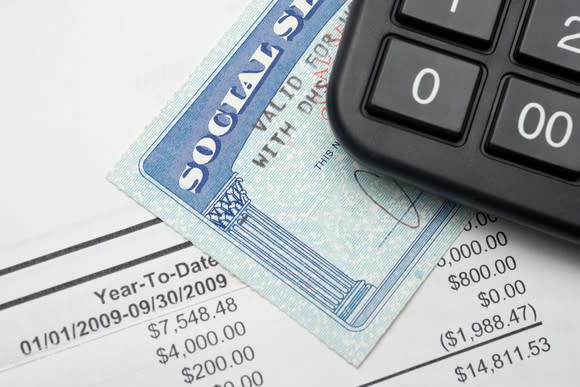What Is the 2018 Maximum Social Security Tax?
Close to 62 million Americans received an estimated $955 billion in Social Security benefits in 2017. Money for Social Security retirement benefits comes from the Social Security trust fund, which is funded by tax dollars and invested in special-issue securities issued by the U.S. Treasury.
How does the money get into the trust fund? From taxes levied to fund Social Security.
Whether you earn income from an employer or from freelance work, you must pay Social Security taxes. However, these taxes are not necessarily assessed on every dollar of income earned. There's a wage cap on Social Security benefits, which means there's a maximum amount of taxes you'll have to pay into Social Security each year. This amount is adjusted upward periodically to keep pace with the increase in average wages.

Image source: Getty Images.
What is the maximum 2018 Social Security tax?
For 2018, the maximum amount of Social Security taxes you'll have to pay as an employee is $7,960.80. To understand where this number comes from, it's important to understand how Social Security taxes work.
Social Security taxes are assessed on all wages earned, up to a capped maximum. In 2018, the cap is $128,400. Employees are taxed at 6.2% of wages earned, so if someone earned the maximum taxable wages of $128,400, they would pay $7,960.80.
In addition to Social Security taxes, workers also pay a Medicare tax of 1.45%. The earnings subject to the Medicare tax are not capped, so employees pay this 1.45% on their entire incomes. High earners owe an additional .9% on earned income above $200,000 for single filers and heads of household; above $125,000 for married spouses filing separately; or above $250,000 for married couples filing jointly.
How much will your Social Security tax be in 2018?
While the maximum Social Security tax for 2018 is $7,960, only a small percentage of taxpayers have incomes high enough to pay the maximum. In 2015, for example, just 6% of workers earned more than the capped amount, according to the National Academy of Social Insurance.
If your income is below the cap, the amount you pay will be less. To calculate the amount you'll be taxed, multiply your taxable earnings by 6.2%. This table also shows the maximum Social Security taxes that will be paid in 2018 by employees at different income levels.
Salary | Social Security Taxes | Medicare Taxes | Total Taxes |
|---|---|---|---|
$20,000 | $1,240 | $290 | $1,530 |
$30,000 | $1,860 | $435 | $2,295 |
$40,000 | $2,480 | $580 | $3,060 |
$50,000 | $3,100 | $725 | $3,825 |
$60,000 | $3,720 | $870 | $4,590 |
$70,000 | $4,340 | $1,015 | $5,355 |
$80,000 | $4,960 | $1,160 | $6,120 |
$90,000 | $5,580 | $1,305 | $6,885 |
$100,000 | $6,200 | $1,450 | $7,650 |
Calculations by author.
Employers also pay Social Security taxes on your behalf
While employees pay a tax equal to 6.2% of their wages for Social Security and 1.45% of their wages for Medicare, this is not the total amount of Social Security tax collected for each worker. The total amount due for each employee is 12.4% of wages for Social Security and 2.9% of wages for Medicare.
Employees pay only a portion of their Social Security and Medicare taxes because employers pick up the other half of the tab. For example, for a worker who earns that maximum $128,400, the actual amount paid into Social Security on their behalf is $15,921.60.
Because Social Security taxes are due on self-employment income, as well as wage income, freelancers need to pay the full amount of Social Security taxes themselves. A freelancer who made $128,4400, or more, would have to pay the whole $15,921.60. However, freelancers can deduct half of the Social Security taxes paid to reduce their adjusted gross income.
Where exactly is your Social Security tax money going?
Many taxpayers are rightfully concerned about what's happening to the thousands of dollars they -- and their employers -- pay into Social Security each year. While money paid in is invested in a Social Security trust fund and used to buy securities issued by the U.S. Treasury, the problem is that this invested money isn't just being kept safely invested in securities until the person who paid it retires. Instead, the Social Security Administration sells securities regularly to pay current beneficiaries.
The problem is, program costs are expected to exceed tax revenue, so the Social Security trust fund is projected to run short of funds by 2034, as of the most recent Social Security Trustees report. If this occurs, benefits will need to be cut, or taxes will need to be raised.
Don't rely on Social Security for your retirement income
If you're looking ahead toward retirement and worried that Social Security benefits will be cut, you have reason for concern. But regardless of whether or not cuts occur, Social Security benefits are not enough to live on without other sources of income.
The maximum benefit that's available to retirees from Social Security in 2018 is just $2,788. This would provide an income of $33,456 -- which is below what the average American retiree is spending. With high healthcare costs and Social Security not keeping pace with actual increases in cost of living for seniors, it's imperative you have investment income to keep you going through retirement.
This means that you should start investing in your 401(k), IRA, or other tax-advantaged account today so you won't be struggling to survive on Social Security during what are supposed to be your golden years.
More From The Motley Fool
6 Years Later, 6 Charts That Show How Far Apple, Inc. Has Come Since Steve Jobs' Passing
Why You're Smart to Buy Shopify Inc. (US) -- Despite Citron's Report
The Motley Fool has a disclosure policy.

 Yahoo Finance
Yahoo Finance 